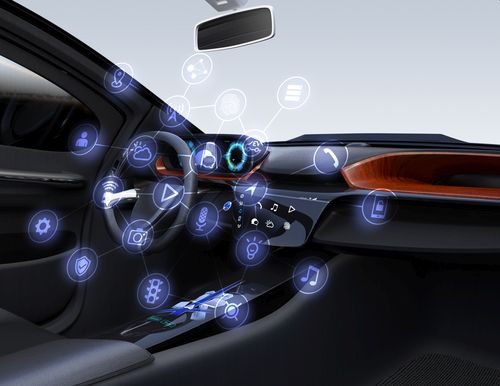China continues to lead the way in smart electric cars
CCTV cites figures from China’s Ministry of Industry and Information Technology. In May, electric vehicles recorded a market share of more than 10 percent of the total car market. Of those, more than 15 percent have Level 2 autonomous driving assistance systems, said Luo Junjie, a department head at the ministry. Even though there was a slight decline in passenger car sales in the previous year, the number of intelligent vehicles with assistance systems continued to go up.

In total, just over 3 million vehicles with Level 2 or higher autonomous driving capability were sold in 2020. That represents a 107 percent increase over the previous year. These figures were provided by a staff member of the Automotive Industry Division of the Council for the Promotion of International Trade. According to estimates, the market share of vehicles with assistance systems for partially or fully autonomous driving in China will rise to more than 50 percent by 2025, CCTV reports.
Vehicles in China that drive autonomously or with driver monitoring include private-use cars as well as public cabs, buses or vans. In the southern Chinese city of Guangzhou, which has become a center for testing self-driving vehicles, startup WeRide has developed driverless cars for transporting people as well as buses. Baidu, operator of China’s largest Internet search engine, partnered with state-owned automaker BAIC Group to build 1,000 self-driving cabs over the next three years. After initial field trials in selected cities, they plan to offer the service, called “Robotaxi,” throughout China. The Apollo Moon vehicle used will be produced under BAIC’s ARCFOX e-car brand while Baidu will contribute the autonomous driving system and software.
Electric vehicles and components such as their batteries or electronics must be awarded a CCC certificate in order for the products to be exported to China or manufactured locally. The CCC certificate was introduced in 2002 and is comparable to the European CE marking. If you need CCC certification in the automotive sector, China Certification is an excellent partner for you. We have been advising leading automotive suppliers and vehicle manufacturers on their CCC certifications for years.
For more information on how CCC certification, the CCC Self-Declaration and voluntary CCAP or CQC certification may affect your company, or for more information about CCC certification in general, the process, and the associated costs, please visit our website and our News Section where you will find current updates twice a week.
Please do not hesitate to contact us for further details and consultation. You can contact us via e-mail, or call us (UK: +44 2071931135, Rest of Europe: +49 69 2713769150, US: +1 773 654-2673).
Please don’t hesitate to also use our chat-window in the bottom right corner if you have any questions. (Please check your browser settings if you can’t see the window)
You can also check out our free CCC-Brochure, which can be downloaded right here as a PDF file or you consult our book (in English) “A Brief Guide to CCC: China Compulsory Certification”, which can be found directly here on Amazon.
Here you can download our brochure about the CCC Self-Declaration.
Here you can download our brochure about the voluntary CCAP or CQC certification.
China CCIC Pre-Shipment Inspections Remain Relevant for the Export of Used Machinery To China
Imports to China continue to rise steadily. According to CNBC, China’s imports in March 2021 exceeded last year’s expectations by almost 15%. These imports also include used machinery and equipment, which must undergo a CCIC Pre-Shipment Inspection (PSI) before shipment.

Chinese customs, represented in Germany by the China Certification & Inspection Centre (CCIC), requires that used machinery conform to Chinese safety standards. This conformity must be evidenced by a pre-shipment inspection report. During the inspection, the machines to be shipped are checked for their safety, hygiene and environmental compatibility – in compliance with China’s legal requirements.
Both used machines and products that have not yet been used but have been stored for too long must undergo the inspection. A list of machines that require the PSI inspection report can be found in the overview about the China CCIC Pre-Shipment Inspection (PSI).
Although the process of the China Pre-Shipment Inspection has been simplified in recent years, problems still often occur, mainly due to incorrect documentation or insufficient preparation.
To avoid these mistakes and the resulting costs and time, we can organize and manage the inspection for you. Please do not hesitate to contact us if you have any questions about this.
Please do not hesitate to contact us for further details and consultation. You can contact us via e-mail, or call us (UK: +44 2071931135, Rest of Europe: +49 69 2713769150, US: +1 773 654-2673).
Please don’t hesitate to also use our chat-window in the bottom right corner if you have any questions. (Please check your browser settings if you can’t see the window)
China’s leading chip manufacturer SMIC is building a new production facility
The largest and also one of the most important Chinese chip manufacturers in China, Semiconductor Manufacturing International Corporation (SMIC), is building a new production facility in Shenzhen for 2.35 billion US dollars. The capital for the investment was provided jointly by the company and the local government of the city of Shenzhen. Shenzhen is known in China as a technology center and is home to companies such as Tencent and Huawei. By expanding chip manufacturing at SMIC, China hopes to strengthen its independence from other overseas manufacturers. In light of tensions with the U.S., it has been revealed that China, as the world’s second largest economy, is dependent on foreign technology in their chip industry.

SMIC can hope for full order books. The current global shortage of semiconductors has caused certain industries, such as the automotive industry, to turn to other suppliers. Cars don’t necessarily require the latest chips, one analyst told CNBC. SMIC could therefore supply those manufacturers with its slightly older chip technology, he said. The subsidiary that will operate the new Shanghai plant is mainly made up of 55 percent SMIC shares and 23 percent from a state-owned holding company. The remaining capital is contributed by private investors.
Machinery and production plants are subject to CCC certification in China. CCC stands for China Compulsory Certificate. The CCC certificate was introduced in 2002 and applies to both imported and Chinese products. We will be pleased to provide you with non-binding advice on the scope and requirements of China CCC certification.
For more information on how CCC certification, the CCC Self-Declaration and voluntary CCAP or CQC certification may affect your company, or for more information about CCC certification in general, the process, and the associated costs, please visit our website and our News Section where you will find current updates twice a week.
Please do not hesitate to contact us for further details and consultation. You can contact us via e-mail, or call us (UK: +44 2071931135, Rest of Europe: +49 69 2713769150, US: +1 773 654-2673).
Please don’t hesitate to also use our chat-window in the bottom right corner if you have any questions. (Please check your browser settings if you can’t see the window)
You can also check out our free CCC-Brochure, which can be downloaded right here as a PDF file or you consult our book (in English) “A Brief Guide to CCC: China Compulsory Certification”, which can be found directly here on Amazon.
Here you can download our brochure about the CCC Self-Declaration.
Here you can download our brochure about the voluntary CCAP or CQC certification.
China set to dominate global 5G development
The report shows that China has taken the lead in 5G adoption over the past year. More than 200 million new 5G connections were registered in China, representing 87 percent of all connections worldwide. By 2025, up to 822 million connections are expected, according to the report. The rapid development of the 5G network in China is driven by a continuous expansion of the network infrastructure as well as the increasing number of capable handsets. Despite the Covid 19 pandemic, Chinese network operators deployed about 600,000 5G radio towers last year, according to the Ministry of Industry and Information Technology. The total now stands at 718,000, putting China first in the world. The report estimates that network operators will spend $210 billion between 2020 and 2025, 90 percent of which will be used to roll out 5G.

Although 4G currently remains the leading technology in China, its peak has already been passed and is being steadily replaced by 5G. It is expected that by 2025, 53 percent of all mobile connections in China will be made using 4G technology and 5G will have caught up to 47 percent. According to customer surveys by GSMA, Chinese users want to move to 5G earlier than the global average. Last year, 163 million 5G-enabled smartphones were shipped in China, accounting for 53 percent of the total market. According to the GSMA study data, about 1.22 billion residents in China had mobile subscriptions by the end of 2020, accounting for 83 percent of the total population. This figure puts China among the most developed mobile markets in the world while the global average is 66 percent. Of the total 1.22 billion mobile users in China, 990 million use a cell phone with Internet access. This number is expected to increase by another 200 million by 2025.
Cell phones and certain accessories require a CCC certificate, where CCC stands for China Compulsory Certificate. Products requiring certification, the list of which is frequently expanded or amended, may only be imported into China, sold in China and used in business activities in China after the product has undergone CCC certification.
In addition to that, a SRRC Type Approval is required for radio transmission equipment, in order to obtain a Network Access License (NAL).
For more information on how CCC certification, the CCC Self-Declaration, voluntary CCAP or CQC certification or SRRC Type Approval may affect your company, or for more information about CCC certification in general, the process, and the associated costs, please visit our website and our News Section where you will find current updates twice a week.
Please do not hesitate to contact us for further details and consultation. You can contact us via e-mail, or call us (UK: +44 2071931135, Rest of Europe: +49 69 2713769150, US: +1 773 654-2673).
Please don’t hesitate to also use our chat-window in the bottom right corner if you have any questions. (Please check your browser settings if you can’t see the window)
You can also check out our free CCC-Brochure, which can be downloaded right here as a PDF file or you consult our book (in English) “A Brief Guide to CCC: China Compulsory Certification”, which can be found directly here on Amazon.
Here you can download our brochure about the CCC Self-Declaration.
Here you can download our brochure about the voluntary CCAP or CQC certification.


